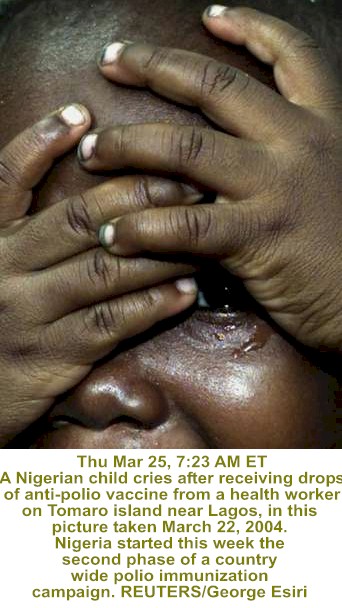 |
Vaccine Boycott Grows in
Northern Nigeria
http://abcnews.go.com/wire/World/ap20040224_1427.html
 |
KADUNA, Nigeria Feb. 24 — Two more states in
Nigeria's Islamic north joined a boycott Tuesday of a massive polio immunization
campaign, demanding government proof the vaccines don't spread AIDS or sterility
as Islamic leaders contend.
Nigeria, meanwhile, announced it would be days before it had results of lab
tests meant to prove the vaccine's safety too late to change any minds among
Muslim leaders in the four states that are blocking the immunization campaign,
due to end Thursday.
"This is an opportunity lost," U.N. Children's Fund spokesman Gerrit Beger said,
confirming that Niger and Bauchi states had joined the vaccine boycott pending
findings of the government-led investigation.
Northern Nigeria Islamic leaders say the immunization campaign is part of a U.S.
plot to depopulate Muslim northern Nigeria by spreading AIDS or sterilizing
agents. Northern states maintain their own lab tests show contaminants in the
vaccine.
Fourteen million people live in the four states that have blocked the
immunization.
The World Health Organization says a polio outbreak spreading from one of the
states, Kano, has helped spread polio to seven African nations where it had been
eradicated.
The outbreak and vaccine ban threaten a 16-year worldwide effort to wipe out
polio globally by 2005, WHO says.
WHO launched the 10-nation emergency immunization campaign on Monday, sending
hundreds of thousands of volunteers door-to-door with vaccine to inoculate 63
million children.
On Tuesday, some Muslim families turned away vaccination teams even in states
where the campaign has been allowed.
Complicating matters, Nigerian Muslim tradition bans male strangers from
entering homes with women and girls, forcing the medical teams to send in girls
as young as 14 to carry out the inoculations.
"It is difficult to train these young girls to communicate effectively with
parents and vaccinate all children in a methodical way without missing some
areas," said Usman Kariko Binawa, a vaccine campaign organizer.
Just outside the northern city of Kaduna, in the predominantly Muslim village of
Maraban Jos, health workers scrawled check marks with chalk on the mud and tin
houses of families accepting vaccinations. They wrote large "R's" on the those
who refused, so they wouldn't be bothered again.
Binta Abdullahi, a 34-year-old campaign worker in Maraban Jos, came out of the
home of one Muslim family that had refused to have their children immunized.
"They want to wait for the results of the examinations," she said, referring to
the government investigation.
In the nearby village of Barakal Allahu, which is mostly Christian, residents
welcomed the teams.
"We are eager. We've seen polio and we don't want it for our children," said
Stephen Dogo, 74, after his two youngest children were vaccinated.
In the same village, one polio victim a young wheelchair-bound man with twisted,
skinny legs rode past health workers, expressing his approval with the words
"God is Great."
Earlier this month, the Nigerian government sent politicians, scientists and
religious leaders abroad to witness the polio vaccine been tested in foreign
labs.
On Tuesday, the fact-finding team said in a statement it was awaiting test
results from labs in India and expected them as late as the end of the month,
after the vaccine campaign is over.
The Associated Press obtained a copy of the committee's interim report that
ruled the vaccines safe. However, it acknowledged the tests showed
"trace amounts of estradiol," a form of the female hormone estrogen the
vaccine's Muslim detractors claim could cause infertility.
The unsigned four-page document suggested the hormone may have come from calf
blood serum it said was sometimes used to help produce the vaccine.
WHO officials have repeatedly insisted minute amounts of hormones would be
completely harmless, amounting to less than what is found in human breast milk.
Nigerian Health Ministry officials could not immediately be reached for comment
on the leaked document.
Muslims in Nigeria's north have been wary of vaccine campaigns since
1996, when families in Kano state accused New York-based Pfizer Inc. of using an
experimental meningitis drug without fully informing of the risks.
The company denied any wrongdoing. A U.S. court dismissed a lawsuit by
20 disabled Nigerians who allegedly took part in the study, but a U.S. appeals
court later revived it.